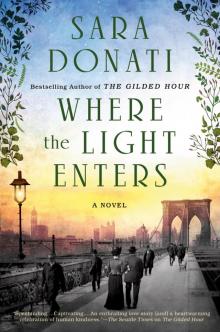- Home
- Sara Donati
Dawn on a Distant Shore Page 11
Dawn on a Distant Shore Read online
Page 11
“Bears is something special, they’ve known him since he was a boy. But they ain’t going to set a place for your daddy’s housekeeper at their table, Elizabeth, and don’t you get no ideas about teaching them different. You just go see to getting us to Montréal as quick as possible and I’ll see to the children.”
“I can hardly believe it is almost a year ago since I saw them last,” said Elizabeth. “To think that I might have forgot my own first wedding anniversary—” And her voice cracked as she stopped herself.
Curiosity’s eyes narrowed. “Don’t you lose hope, now. No reason to believe that you won’t see Nathaniel before your anniversary come around. And this time there won’t be Richard Todd interfering.”
“True enough. But there is the small matter of George Somerville.”
With a flick of her fingers, Curiosity dismissed the lieutenant governor. Elizabeth hoped it would be so simple.
General Schuyler’s study smelled of old paper and strong ink, tobacco and ashes in the cold hearth. Hannah’s breath hung milky in the air, but it was quiet here and there was a deep chair by a window that looked toward the river. She stood there a moment to watch the last of the afternoon sunshine spark rainbows from fingers of ice that hung from the eaves. One crackled suddenly and fell to the softening snow.
A man rode up on a bay gelding and stopped at the gate. Another visitor, this one dressed in a greatcoat, striped breeches, and a slouch hat with a drooping turkey feather. So many callers. At Lake in the Clouds they could go a month without a visitor.
Voices on the stairs; the general was coming this way. Hannah cast a regretful glance over the worn leather volumes that lined the bookshelves, and slipped out into the hall.
Wherever she might go there would be grown-ups talking about their journey. The children she had played with in the afternoon were gone now, away home with their parents. She wondered if they all lived in houses like this, filled with crystal and silver and wood polished until you could see your face in it. Every window was glass, every dish was porcelain, and beeswax candles burned in sconces of silver and brass. No one here wore buckskin and the only linsey-woolsey to be seen was on the backs of the stableboys. The grown-ups were kind enough and more than generous with what they had, but this was a strange silken world and it made Hannah uncomfortable in her skin.
Redskin, one of the older boys had called her during the game of snow-snake; pimple-faced, he bared his buck teeth when he smiled. He had waited until Runs-from-Bears was out of earshot to do it. Dirty redskin, and then he yanked hard on her plaits.
He was big and clumsy and she tripped him without a moment’s hesitation and left him bloody-nosed in the snow. Then Hannah ran back to the game, showing them all what a red-skinned girl could do, sending the wooden snake slithering so far on the ice track that they lost sight of it and the boys gave up, muttering among themselves.
There was an unlit stairway at the back of the hall for the servants’ use. Hannah found her way there and sat, her knees up under her chin, listening to the house. In the kitchen, maids argued in Dutch until the housekeeper sent them off to set the table. Upstairs a baby wailed and then was quieted. In the front hall the overseer, a huge barrel of a man with an old wig that kept slipping off his head, was talking to the visitor. From behind the closed door of the sitting room came the regular rise and fall of women’s voices: Aunt Merriweather, as steady as the tide; Elizabeth’s gentle voice in counterpoint. Hannah wished suddenly to be with Elizabeth, who understood this strange place. She had given up a life like this to come to them on Hidden Wolf.
“May I join you?”
Hannah was startled out of her daydream. Will Spencer stood before her at the foot of the stairs. Everything about him shone in the dimness: brass buttons and silver buckles, gleaming white linen at his neck, even the thinning pale hair. He was middle sized, slight of build. Hannah had the urge to take one of his hands and examine it, to see if it was as soft as it looked. His only calluses came from holding a quill, his only scars were drawn in ink.
She pressed over to one side to make room for him.
“Very clever of you to find a peaceful spot. They are few and hard to come by in this household.”
“Is this your private hiding place?” Hannah asked.
“Certainly not. There’s room enough for both of us.” He flipped up his coattails neatly before sitting, took off his spectacles and pulled a handkerchief from his pocket.
In Hannah’s experience, white men had three ways of dealing with her: most would ignore her, a few might feel an obligation to question her on the fine points of her education or parentage, and some would ask her silly or insulting questions about the Kahnyen’kehàka way of life. He seemed to lean toward none of these, which was a great relief.
“Are you coming with us?” she asked finally.
“Of course.” He tucked his handkerchief into his sleeve. “Elizabeth needs my help. Perhaps I can be of some assistance to your father and grandfather.”
It was hard to imagine how this quiet man in his silk hose and striped waistcoat could be of help, but Hannah nodded politely.
“You are very worried,” he said.
“Shouldn’t I be?”
He thought while he adjusted his spectacles over his ears. “Your stepmother is a very determined and resourceful person. She has one of the finest minds I have ever encountered and she certainly does not lack for courage. If I were sitting in a garrison gaol I would breathe much easier knowing that she was working for my release.”
“That’s not what I asked you.”
Will Spencer inclined his head. “There is cause for concern. But I think that together we may well manage to see a happy end to all of this. We have the law on our side.”
And the Tory gold, thought Hannah. “The gaol key would be enough,” she said aloud.
He smiled then, the first broad smile she had ever seen from him. “The Canadians will be sorry that they ever took on the Bonners.”
“I think the Schuylers already are.”
He laughed softly. “General and Mrs. Schuyler seem to thrive on such adventures, and I am sure that their interest and concern for your father and stepmother are sincere. Nathaniel once did them a good turn that they have never forgot. You must know the story of how he saved their eldest son.”
“Oh, yes,” said Hannah. “But I was thinking more of one of the grandsons. I gave him a bloody nose this afternoon.”
“I see,” said Will. “The one with the unfortunate teeth, and manners to match?”
She glanced at him from the corner of her eye. “He called me a name.”
“That seems in character.”
“You aren’t going to tell me I should not have tripped him?”
One corner of the pale mouth turned downward. “I suppose I should tell you just that. But I should have done exactly the same thing, and it would be hypocritical to pretend otherwise.” He looked her directly in the eye. “I expect that it is not the last time you shall have to deal with such ignorance.”
Hannah nodded. “That is just what my grandmother said before I left Hidden Wolf. She said that I would have to use my head rather than my fists.”
“A wise woman.”
“It is harder to do than to say.”
“How true. I would suggest that you begin by observing your stepmother; she has learned the way of it. For the moment, however, I believe we are expected at the table.”
The man in the striped breeches turned out to be a Captain Grievous Mudge. He had the biggest hands that Hannah had ever seen, a great waterfall of gray chin whiskers, and a mustache that twitched when he talked, which he did so forcefully and so fast that even Elizabeth’s aunt had no opportunity to interrupt. The old lady seemed both fascinated and repelled as she watched the captain inhale peppery white soup, pheasant stuffed with prunes and raisins, ham, creamed potatoes, corn preserves and pickled snap beans—and exhale the story of his life on the waterways.
“I b
een transporting all manner of goods from Albany to Montréal for thirty year or more now,” he concluded. He poked his silver fork toward the travelers. “I can transport you, too.”
“Are you originally from New-York, Captain?” asked Amanda.
“I’m a Yorker born and raised,” said Mudge, sawing at a hunk of ham with obvious pleasure. “But my mama was a Connecticut Allen, and I’m blood kin to Ethan and the Green Mountain Boys. Nobody knows the big water better.” He glanced at Runs-from-Bears, who had been having a quiet conversation with Will Spencer at the far end of the table. “Well, almost nobody. There’s the Mohawk, of course. Glad to have you along, Bears. Be like the old days when you tagged along with your daddy.”
“I did not realize that you were acquainted,” said Elizabeth, looking as surprised as Hannah felt. “Where did you meet?”
Runs-from-Bears looked up from his plate. “Ticonderoga.”
The name was enough to set off nods of acknowledgment around the table. In New-York State, there was barely a body breathing who did not know the story of the battle for the fort in every detail. Hannah would have liked to hear it again, but the old aunt thumped the floor with her cane.
“Not another war story! What a bellicose young nation you are. No dinner party seems complete without a discussion of one revolution or another.” Her hand made a long corkscrew in the air. “A most untidy business.”
“It is the age we live in, Lady Crofton,” said General Schuyler. “The world is changing all around us, and for the better, on the whole.”
She clucked her tongue at him. “Poppycock. Now and then ladies are taken with the urge to rearrange their sitting rooms. Men do the same with their governments. Thus it has always been, and thus it will always be.”
Hannah hid her smile in her serviette, not so much at Aunt Merriweather, but at these white people who did not know how to cope with a strong-minded woman whose tongue had been loosened by age. Amanda was almost humming her embarrassment, Mrs. Schuyler was examining her wine glasses, and the men made gruff or conciliatory noises. Even Will Spencer, who seemed to Hannah a reasonable man, was staring at his plate, his brow creased hard. Only Elizabeth and Bears were smiling openly.
“Captain Mudge will deliver you safely,” General Schuyler said, moving the conversation back toward safer topics. “He’s the man to deal with smugglers and ice floes.”
“Smugglers!” Amanda flushed, and put a small hand on her husband’s arm.
“Fur runners from Lower Canada,” explained Runs-from-Bears. “Coming down with the winter’s takings. They don’t bother folks who stay out of their way.”
Will Spencer leaned toward Hannah. “It sounds like high adventure. Are you ready for it?”
“Of course she is not,” said Aunt Merriweather, turning a watery eye on Hannah. “Such a sensible girl. She will stay behind with me, will you not, child?”
“No, ma’am,” Hannah answered politely.
The captain laughed heartily at Aunt Merriweather’s pinched expression. “She’s Nathaniel’s girl, right enough, missus. Can’t hold her back.” He turned to Elizabeth. “Folks say you had some adventures of your own last summer, Mrs. Bonner. I’d like to hear the story. I knew Lingo, the old polecat.”
Elizabeth’s expression went suddenly very still. Hannah felt her own face coloring in apprehension; the subject of Jack Lingo was one best avoided, but all around the table heads were turning. Mrs. Schuyler’s curious expression, wondering how Elizabeth would meet this challenge; Amanda’s slightly confused one. The old aunt, looking annoyed at having less information than she believed was her due. Hannah doubted that she would credit it even if she were told the story of what had passed between Jack Lingo and her niece.
“What’s this?” the old lady sputtered. “Who is this Lingo? A friend of yours, Elizabeth?”
“No, Aunt,” Elizabeth said hoarsely. She touched the base of her throat where a silver chain disappeared into her bodice. “No friend of mine.”
General Schuyler coughed softly. “He was just an old courier du bois, Lady Crofton.”
“A Frenchman?” asked Aunt Merriweather, in the same tone she might have said heathen.
The general inclined his head. “I believe he was French born, yes. But more important, he was a thief, and a scoundrel of the highest order. It is not a tale for polite company.”
“Hmmpf!” commented the captain around a forkful of ham. His eyes flashed in Elizabeth’s direction, but he swallowed down his curiosity.
“I think the travelers are more concerned about the condition of the portages,” said Mrs. Schuyler, neatly cutting off the aunt’s response.
“Yes,” said Elizabeth, more calmly. “I had been wondering about the portages.”
The captain swallowed, the mustache twitching with a life of its own. “There’s only one thing to do when you’ve got to cross those carries in April,” he said, reaching for the potatoes.
Aunt Merriweather put down her glass with a thump. “Well, man, what is to be done then? Speak up!”
“Pray for a frost, missus,” said the captain, meeting her glare with perfect Yorker calm. “Pray mighty hard.”
• • •
Late in the evening, much later than she would have wished, Elizabeth found her way to her room. Hannah was already deeply asleep on a camp bed near the banked hearth, the twins in their cot within her reach. Elizabeth knew that Hannah would wake at the twins’ first stirring, and that they might even settle at the sound of her voice. She had a sure and loving touch far beyond her years.
Elizabeth reached down to smooth a strand of hair away from the little girl’s brow. Such a serious child, and so dear. She should have left her behind at Lake in the Clouds where she would be safe, but she had given in. As a girl, her own curiosity about the world had been thwarted so often; she could not do the same to Hannah, not with so much at stake. She was young, and still there was so much of Nathaniel in her.
With a last check on the twins, Elizabeth went to the window to look beyond the winter-barren trees to the river. A rustling below her window, and a woman’s shape moved away from the house, a long cape sweeping out behind her in a dark arc against the moonlit snow. Her hood fell away and Elizabeth saw blond hair. One of the daughters, then. And slipping away in the night, perhaps to meet a lover.
Elizabeth rubbed her eyes, and tried to focus. What she knew was very simple: Nathaniel and Hawkeye and Robbie slept in a cold gaol far to the north; without intervention they might well hang. There was no time to waste and no energy to spare, and certainly she could let this young woman go on her way. She was forsaking a warm bed and risking the favor of friends and family to go to her lover; Elizabeth could not chide her for that. It seemed not so very long ago that she had gone to Nathaniel in the dead of night. Of her own free will she had gone to him, a backwoodsman in buckskin with an eagle feather in his hair, a man with nothing to recommend him to the world but his honesty, his skill with a rifle, and an affinity for the wilder ness. A widower with a dark-skinned daughter. Anything but a gentleman. She had married him on the run, turning her back on her family, their view of the proper order of things, and their expectations, and she regretted none of it.
8
Elizabeth woke on a spring morning to find herself alone in the small cabin of Grievous Mudge’s schooner, the Washington. Beside her was an empty makeshift cradle and a pile of neatly folded blankets. Blinking in the shifting sunlight, Elizabeth lay for a moment and listened to the steady beat of waves on the hull, the familiar rhythm of men’s voices as they called to each other, a hiccup of a cry, and Curiosity’s comforting hush in response. With a yawn, Elizabeth walked the two steps to push back the shutters that opened onto the main deck.
Pale blue sky, cloudless and mild. One of the crew whistled by, his shirtsleeves rolled high. How strange, to dread warm weather. But she managed a smile for Curiosity, who sat on a coil of rope rocking the babies in the cradle of her skirt.
“We was just a
bout to come callin’,” said Curiosity, catching sight of her. With a practiced dip, she passed a wriggling Daniel down and through the window. Lily followed in short order, and Elizabeth settled back down on the narrow bunk to see to their needs. She longed to get out of the cabin, which smelled of tobacco and sweat and wet winding cloths; she might have nursed the babies in the sunshine with a shawl draped over herself and no one would have been the wiser, but she feared offending the sailors. The dozen who manned this schooner seemed to be good sorts, but like all seamen they were full of superstitions about women, and she would do nothing to jeopardize their progress toward Montréal.
In short order Curiosity was at the door with a plate of corn bread and venison stew. Somewhat better fare than they might have expected on a schooner stripped down to the bone for the short-run, fast transport of high-value goods, but then the captain was fond of his food.
“Mighty pretty morning,” she announced, holding out a tin cup of weak tea. “Nothing like a clear day on the water with the mountains all around.”
“Yes,” Elizabeth agreed, reaching for the cup over the pillow that supported the babies. “It is pretty here. Where is Hannah?”
“Talking to Mudge.”
From the corner of her eye, Elizabeth observed Curiosity’s pinched expression. “Captain Mudge has a few stories to tell.”
“Some seem to think so.”
Elizabeth smiled to herself. More than a week of muddy portages, cold rain, cramped living quarters, and poor food seemed of less concern to Curiosity than the fact that Grievous Mudge was a good storyteller. Elizabeth shifted a bit, and considered.
“You must miss Galileo a good deal.”
Curiosity looked up, her dark eyes narrowed. “Of course I miss Galileo. Ain’t I been wakin’ up next to the man for some thirty year now? We been apart now and then, but it ain’t ever easy. Miss my babies, too.”
Elizabeth had to laugh, thinking of the size and width of Curiosity’s son and of her grown daughters, the most competent of women. Then she shook her head apologetically.

 The Endless Forest
The Endless Forest Into the Wilderness
Into the Wilderness Queen of Swords
Queen of Swords Dawn on a Distant Shore
Dawn on a Distant Shore Lake in the Clouds
Lake in the Clouds Fire Along the Sky Fire Along the Sky
Fire Along the Sky Fire Along the Sky Where the Light Enters
Where the Light Enters Fire Along the Sky
Fire Along the Sky